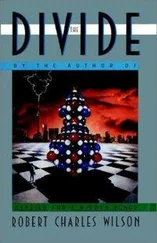Count those years: seven of them, the nervous prewar years, pessimistic years. Years when nothing seemed to go right for the country, even setting aside the economic crisis, the Kuinist youth movement, the bad news from abroad. The Mississippi-Atchafalaya disaster dragged on. Past Baton Rouge, the Mississippi had settled in its new course to the sea. Industry and shipping had been devastated, whole towns drowned or left without drinking water. There was nothing sinister about this, only nature winning a round over the Corps of Engineers. Sedimentation changes river gradients and gravity does the rest. But it seemed, in those days, oddly symbolic. The contrast was inescapable: Kuin had mastered time itself, while we were crippled by water.
Seven years ago, I couldn’t have pictured myself as a glorified scrap dealer. Today I felt fortunate to be in that position. I usually cleared enough money in any given month to pay the rent and put food on the table. A great many people weren’t so lucky. Many had been forced into the dole lines and the soup kitchens, ripe recruiting grounds for the P-K and A-K street armies.
I tried to phone Janice from the car. After a few false starts I got a connection, at some ridiculously diminished baud rate that made her sound as if she was shouting through a toilet-paper roll. I told her I wanted to take Kait and David out for dinner.
“It’s David’s last night,” Janice said.
“I know. That’s why we want to see them. I know it’s short notice, but I wasn’t sure I’d be finished downtown in time.” Or whether I would have the cash to fund even a home-cooked meal for four, but I didn’t say that to Janice. The Marquis boards had subsidized this little luxury.
“All right,” she said, “but don’t bring them back too late. David gets an early start tomorrow.”
David had received his draft notice in June and was off to basic training at a Uniforces camp in Arkansas. He and Kaitlin had been married for just six months, but the draft board didn’t care. The Chinese intervention was eating up ground troops by the boatload.
“Tell Kait I’ll be there by five,” I said, as the phone link crackled and then evaporated. Then I called Ashlee and told her we’d have guests for dinner. I volunteered to do the shopping.
“I wish we could afford meat,” she said wistfully.
“We can.”
“You’re kidding. What — the strat boards?”
“Yup.”
She paused. “There are a lot of places we could put that money, Scott.”
Yes, there were, but I elected to put it on the counter of a butcher shop in exchange for four small sirloin steaks. And at the grocer I picked up basmati rice and fresh asparagus spears and real butter. There’s no point living if you can’t, at least occasionally, live .
Kait and David made their home in a converted storage space over Janice and Whit’s garage. As awful as that sounds, they had managed to turn a chilly peaked-roof attic into a relatively warm and comfortable nest, furnished with Whit’s cast-off sofa and a big wrought-iron bed David had inherited from his parents.
The attic also afforded them a little distance from Whit himself, whose charity they were in no position to refuse. Whit was a dignified Copperhead and disapproved of street fighting; but he took his politics seriously and could be counted on for a little accommodationist lecture whenever the conversation lagged.
I picked up Kait and David and drove them to the small apartment I shared with Ashlee. Kait was quiet in the car, putting on a brave face but obviously worried for her husband. David compensated by chattering about the news (the ousting of the Federal Party, the fighting in San Salvador), but by his voice and gestures he was also nervous. Reasonably so. None of us mentioned China even in passing.
David Courtney hadn’t impressed me when Kait first introduced him last year, but I had come to like him very much. He was just twenty years old and displayed that emotional blandness — psychologists call it “lack of affect” — that is the style of this generation raised in the shadow of Kuin. Underneath it, however, David proved to be a warm and thoughtful young man whose affection for Kait was unmistakable.
He was not especially handsome — he had picked up a facial scar in the Lowertown fires of 2028 — and he was certainly not rich or well-connected. But he was employed (or had been, until the draft notice arrived) driving a loader at the airport, and he was bright and adaptable, vital qualities in these dark days of a dark century.
Their wedding had been a tiny affair, subsidized by Whit and held in a church in Whit’s parish where half the deacons were probably closet Copperheads. Kait had worn Janice’s old wedding dress, which revived some awkward memories. But it was a fine event by modern standards and both Janice and Ashlee had been moved to tears by the ceremony.
Kaitlin went on up to the apartment as David and I set the car’s alarms and security protocols. I asked him how Kait was dealing with his impending departure.
“She cries sometimes. She doesn’t like it. I think she’ll be okay, though.”
“How about you?”
He brushed his hair away from his eyes, revealing for a moment the scar tissue that marred his forehead. He shrugged.
“All right so far,” he said.
I offered to broil the steaks, but Ashlee wouldn’t have it. We hadn’t seen steak for the better part of a year and she wasn’t about to entrust these to my care. I could chop the onions, she suggested, or better, keep Kait and David company and stay the hell out of the kitchen.
Maybe the steaks were a bad idea. They were celebration food, but there was nothing to celebrate tonight. Kait and David exchanged troubled glances and were clearly making an effort to rise above their anxiety, an effort not even briefly successful. By the time Ash served dinner we were all clearly playing a game of mutual denial.
Ashlee and I had rented this fifth-floor apartment shortly after we were married, six years ago in July. Rent was controlled under the Stoppard Act but building maintenance was casual to the point of sloppy. The upstairs neighbor’s water pipes had leaked through our kitchen cupboards, until Ash and I went up there with plumbing tools and PVC and patched up the problem ourselves. But our living-room windows looked southwest across low suburbs — shingles, solar cells, tree-tops — and tonight there was a big moon riding the horizon, almost bright enough to read by.
“Hard to believe,” Kait said, also entranced by the moon, “people used to live up there.”
A lot of things about the past had become hard to believe. Last year I had watched through this same window when the abandoned Corning-Gentell orbital factory burned its way through the atmosphere, shedding molten metal like a Fourth of July sparkler. A decade ago there had been seventy-five human beings living in Earth orbit or beyond. Today there were none.
I stood up to open the curtains a little wider. That was when I noticed the old GM efficiency vehicle parked in front of the barred door of the Mukerjee Dollar Bargain Store, and the bearded man’s face in the automobile window, illuminated, until he looked away, by the glare of a sulfur-dot streetlight.
I couldn’t say for sure that this was the same twitch who had been haunting my table at the Nicollet Mall, but I would have been willing to bet on it.
I didn’t mention this to the family, just sat back down and made myself smile — all our smiles were fabricated tonight. David talked a little more, over coffee, about what he might be facing with the Uniforces over the term of his conscription. Unless he was lucky enough to land a clerical or tech position, he would probably end up in China with the infantry. But the fighting couldn’t go on much longer, he told Kait, so that was okay; and we all pretended to believe this absurd untruth.
Читать дальше












